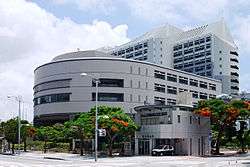Okinawa Prefectural Assembly
| Okinawa Prefectural Assembly 沖縄県議会 Okinawa-kengikai | |
|---|---|
 | |
| Type | |
| Type | |
| History | |
| Founded |
1909 in the Empire[1] 1972 after end of U.S. military rule |
| Leadership | |
President (gichō) |
Masaharu Kina, Independent |
Vice President (fuku-gichō) |
Masatoshi Onaga, Liberal Democratic Party |
| Structure | |
| Seats | 48 |
Political groups |
Government (26) Okinawa (8)
Neutral (7) Opposition (15) Independents/vacant (1) Vacant (0) |
| Elections | |
Last election | 10 June 2012 |
Next election | 5 June 2016 |
| Website | |
| Official website | |
The Okinawa Prefectural Assembly (沖縄県議会 Okinawa-kengikai) is the prefectural parliament of Okinawa.
Its 48 members are elected every four years in 14 districts by single non-transferable vote (SNTV). 13 electoral districts are multi-member district, one district is a single-member district where SNTV becomes equivalent to First-past-the-post voting.
The assembly is responsible for enacting and amending prefectural ordinances, approving the budget and voting on important administrative appointments made by the governor including the vice-governors.
Unlike most mainland prefectural assemblies (Hokkaidō is another exception) the Okinawa Prefectural Assembly was not in existence continuously since 1878. After the Battle of Okinawa, the United States military governed the prefecture. The civilian branch of the military government was the United States Civil Administration of the Ryukyu Islands; a Legislature of the Government of the Ryukyu Islands (立法院) was created in 1952. After Okinawa's return to the mainland in 1972, the Prefectural Assembly was restored. Since then, it had been one of three prefectures in the country that do not elect their assemblies in unified local elections (last round: 2011), the other two being Ibaraki and Tokyo (In 2011, another three prefectures hit by the Great East Japan Earthquake postponed their elections).
Current composition
In the 2012 election on June 10, 2012, governor Hirokazu Nakaima's centre-right supporters (Liberal Democratic Party, Kōmeitō and independents) failed to win a majority. As of 2016, the assembly was composed as follows:[2]
| Composition of the Okinawa Prefectural Assembly | |
|---|---|
| Parliamentary group | Seats |
| Liberal Democratic Party | 13 |
| Social Democratic Party/Kengo network ("Network to protect the constitution") | 8 |
| Kenmin Net ("Prefectural citizens' network") | 7 |
| Japanese Communist Party | 5 |
| Kōmei kenmin mushozoku ("Justice prefectural citizens independents") | 5 |
| Initiatives from Osaka (Ishin no Kai) | 2 |
| Social Mass Party | 2 |
| Independents | 5 |
| Vacant | 1 |
| Total (including vacant seats) | 48 |
Electoral districts
Most electoral districts in Okinawa correspond to current cities or former counties (the counties, abolished as administrative unit in 1921, had initially by definition served as electoral districts for prefectural assemblies in the Empire).
| Electoral districts[3] | ||
|---|---|---|
| District | Municipalities | Magnitude |
| Nago City | Nago City | 2 |
| Uruma City | Uruma City | 4 |
| Okinawa City | Okinawa City | 5 |
| Ginowan City | Ginowan City | 3 |
| Urasoe City | Urasoe City | 4 |
| Naha City | Naha City | 11 |
| Tomigusuku City | Tomigusuku City | 2 |
| Itoman City | Itoman City | 2 |
| Nanjō City | Nanjō City | 1 |
| Miyakojima City | Miyakojima City Tarama Village |
2 |
| Ishigaki City | Ishigaki City Taketomi Town Yonaguni Town |
2 |
| Kunigami County | Kunigami Village Ōgimi Village Higashi Village Nakijin Village Motobu Town Onna Village Ginoza Village Kin Town Ie Village Izena Village Iheya Village |
2 |
| Nakagami County | Yomitan Village Kadena Town Chatan Town North Nakagusuku Village Nakagusuku Village Nishihara Town |
5 |
| Shimajiri County | Yaese Town Yonabaru Town Haebaru Town Kumejima Town Tokashiki Village Zamami Village Aguni Village Tonaki Village South Daitō Village North Daitō Village |
3 |
References
- ↑ Okinawa Prefectural Assembly: History
- ↑ Assembly members by parliamentary group(Japanese)
- ↑ Okinawa Prefectural Assembly: Organizational structure and electoral districts
External links
- Okinawa Prefectural Assembly (Japanese), Resolutions related to the U.S. military presence in English
- Okinawa Prefectural Electoral Commission (Japanese)